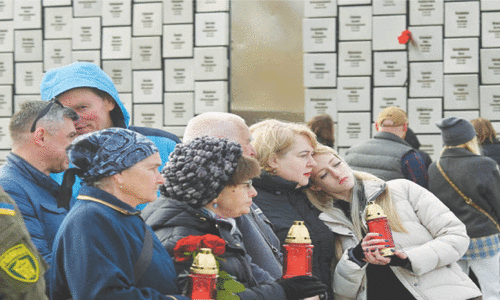WHEN the shocking news came in from Karachi on May 8, 2002, of the bombing of a bus carrying employees of DCN, the French directorate of naval construction, killing 11 of them, it was naturally taken here as the work of religious extremists. After all, this was so close to the New York 9/11 attacks and the decapitation of the Wall Street Journal reporter Daniel Pearl on Feb 1 the same year in the same city.
However, not very long after the tragedy, the French public had to change this perspective as further details were brought home by the media, one after the other in quick succession, of what was quickly baptised here as l’Affaire Karachi.
Today, 11 years later, the Karachi affair continues to be hot news in France and the revelations are as fascinating as they are mind-boggling in the sense that they bring in a seemingly endless list of names and events with each revelation.
So complicated in fact that the newsweekly l’Express published an article sometime ago on the subject with the headline, ‘Seven questions to ask to understand the Karachi Affair’.
The daily le Monde on its part posted on its site a video entitled “Three minutes to know all about the Karachi affair”.
But what on earth is the Karachi affair? Simply stated, it goes something like this:
In 1994 France sold three Agosta military submarines to Pakistan for, to put it roundly, one billion euros. Fifty million of these euros were set aside as ‘gift’ to be shared by some of Pakistan’s politically powerful figures of the time as well as military officers who had, one way or the other, thrown in their weight to make the deal see the light of day.
So far so good! But things started getting somewhat murky when it was discovered by the French media that an infinitesimal part of this sum, about two million euros, had trickled back to France, all in accordance with a preconceived deal, to finance the campaign of the then prime minister Edouard Balladur, who was a candidate and rival to Jacques Chirac in the presidential election of 1995.
Chirac, a rightist like Balladur himself, won the election and became the President of France. But only two years later he had to enter into an uneasy coexistence arrangement with the opposition leftist leader Lionel Jospin whom he was forced to appoint, according to the French constitution, as prime minister because of the Socialist majority in the National Assembly following the 1997 parliamentary elections.
It was only in 2002 when Chirac was re-elected and his party was enjoying a comfortable majority in the National Assembly that he had time, and powers enough, to have a closer look at the Karachi affair files. On learning that all the kickbacks had not yet been fully paid to the Pakistani collaborators, and not forgetting the fact that part of the money had financed the campaign of his rival, he took action and signed a law making the practice of paying sweeteners to foreigners on arms deals illegal.
The tirade of accusations, counter accusations and the list of the names of businessmen and politicians involved, or supposedly involved in the deal assumed unprecedented proportions when a French intelligence agency report suggested the terrorist attack in front of the Sheraton Hotel in Karachi was in fact in retaliation for the decision by Jacques Chirac to abruptly suspend further payments of commissions to Pakistanis who were involved in the sale of Agosta submarines.
Experts today describe the Karachi affair as a cobra with multiple heads. Going through all these intricate details will take up a lot of space in this column and could prove confusing to the reader, but two points remain at the focus of French newspaper, radio or television stories that recur regularly after an interval of every two or three days.
One involves a possible connection with former president Nicolas Sarkozy who had played an important role during the failed election campaign of Edouard Balladur. Sarkozy’s home and offices were recently raided by the investigation forces in an effort to recover some documentary evidence. Whether they succeeded in this was not made public.
The other element has to do with a lawsuit against Jacques Chirac on behalf of the families of the victims of Karachi bombing. They accuse the former president, who is 81 today by the way, of involuntarily being the principal cause of the deaths of DCN employees by his decision to cancel the Agosta submarines commissions to Pakistanis.
The writer is a journalist based in Paris. (ZafMasud@gmail.com)











































